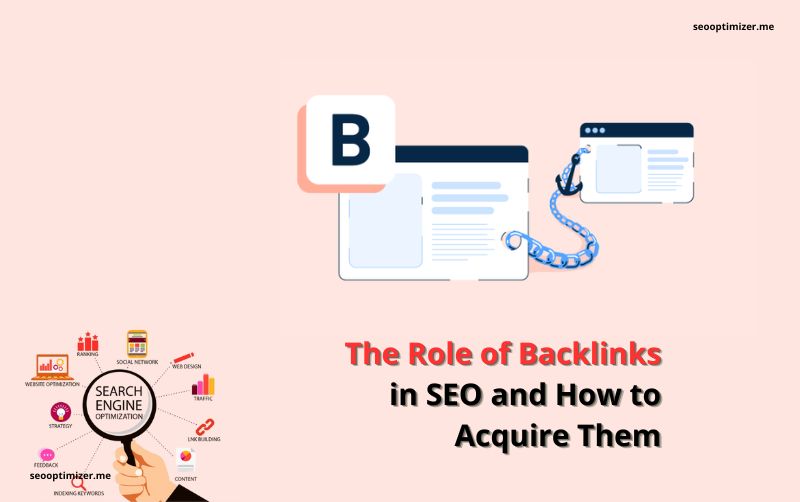The Role of Backlinks in SEO and How to Acquire Them

What are Backlinks?
A backlink, also known as an "inbound link" or "incoming link," is a link from one website to another. When a website links to another website, it is essentially "vouching" for the quality and credibility of the linked website. Search engines use backlinks as a way to measure the authority and popularity of a website.
Why are Backlinks Important for SEO?
Backlinks are important for SEO because they signal to search engines that other websites consider the linked website to be a valuable resource. Search engines use backlinks as a way to determine the quality and relevance of a website's content. A website with a large number of high-quality backlinks is more likely to rank higher in search engine results pages (SERPs) than a website with few or no backlinks.
However, it's important to note that not all backlinks are created equal. Backlinks from high-authority websites are more valuable than backlinks from low-authority websites. Similarly, backlinks from websites that are relevant to the content of the linked website are also more valuable than backlinks from irrelevant websites.
Also read: SEO Auditing & How to Conduct an SEO Audit for a Website
How to Acquire Backlinks
Below are steps you can take in order to acquire backlinks.
1. Create High-Quality Content
One of the best ways to acquire backlinks is to create high-quality content that people will want to link to. When you create valuable and informative content, other websites will naturally want to link to it as a resource for their own readers. This is commonly referred to as "link bait" or "linkable assets."
However, creating high-quality content is not enough. You also need to promote your content to ensure that it reaches the right audience. You can promote your content through social media, email marketing, or by reaching out to other websites and asking them to link to your content.
Suggested read: SEO and Everything in-Between
2. Guest Blogging
Guest blogging is a popular method for acquiring backlinks. It involves writing a blog post for another website in your niche, and in return, you receive a backlink to your own website. Guest blogging not only helps you acquire backlinks, but it also allows you to reach a new audience and build relationships with other websites in your industry.
When guest blogging, it's important to choose websites that are relevant to your niche and have a good reputation. You should also ensure that the content you write is high-quality and provides value to the readers of the website.
Also read: 8 Essential Web & SEO Tools for Auditing and Monitoring Websites
3. Broken Link Building
Broken link building is a method for acquiring backlinks by finding broken links on other websites and suggesting a replacement link to your own website. This involves finding a website that has a broken link on one of their pages and reaching out to the website owner to suggest a replacement link to your own website.
To find broken links, you can use tools such as Ahrefs or Broken Link Checker. Once you have found a broken link, you can use an email outreach template to reach out to the website owner and suggest a replacement link to your own website.
Also read: 7 Steps To Grow your Domain Authority
4. Skyscraper Technique
The skyscraper technique is a method for acquiring backlinks by creating content that is better than the content that is already ranking for a particular keyword. This involves finding a piece of content that is ranking well for a particular keyword and creating a better version of that content.
Once you have created the better content, you can reach out to the websites that are linking to the original content and suggest that they link to your new and improved version instead. This technique works because website owners are more likely to link to content that is better than what they are currently linking to.
5. Resource Page Link Building
Resource page link building involves finding resource pages on other websites and suggesting that they add a link to your own website. Resource pages are pages on a website that link to other websites that are relevant to a particular topic or industry.
To find resource pages, you can use Google search operators such as "intitle:resources" or "inurl:links" along with your niche or industry keywords. Once you have found a relevant resource page, you can use an email outreach template to suggest that they add a link to your website.
Suggested read: 11 Common SEO Mistakes you Should Avoid
6. HARO (Help a Reporter Out)
HARO is a service that connects journalists and bloggers with sources for their articles. By signing up for HARO, you can receive daily emails with requests for quotes and information from journalists and bloggers in your industry. By responding to these requests and providing valuable information, you can earn backlinks to your website from high-authority websites.
Also read: Best Guide for Keywords Usage in SEO
What's Next –
Start SEO Optimization. Analyze your website with Free SEO Optimizer
Audit your website for Free - SEO audit free
Suggested reads:
Also read: SEO for Beginners – Ultimate Guide
Also read: RoadMap to Becoming An SEO Expert
Also read: 15 Top SEO Experts and Specialists
Also read: AI SEO – The Impact of Artificial Intelligence on SEO Strategies
Also read: Google Indexing and How Web Crawler Works




